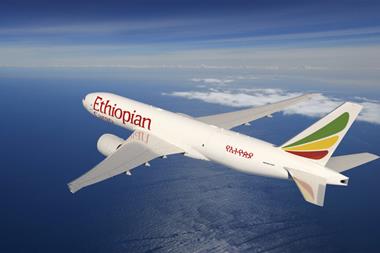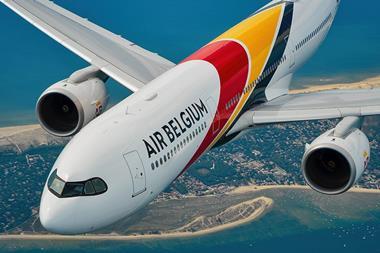Atlas Air Worldwide Holdings got “off to an exciting start in 2017” as it announced 2017 improved income from continuing operations, but it registered a net loss.
During the first quarter income from continuing operations, net of taxes, total $8.3m compared with $7.7m in the year-ago quarter, operating revenues increased by 13.6% year on year to $475.4m, while it registered a net loss of $725,000 against a $471,000 profit for the period last year.
The loss came on the back of a one-off early pay off of debt and from discontinued operations.
The increase in revenues came on the back of charter demand, and the inclusion of Southern Air's CMI business in its results after it acquired the company last year.
President and chief executive Bill Flynn said: “We are off to an exciting start in 2017. We are building on our 2016 achievements and growing our earnings this year.”
Flynn continued: “We will have a full year of contribution from Southern Air and expect a positive impact on our full-year results from our service for Amazon.
“We placed our second 767-300 aircraft into service for Amazon in February, and just added our third and fourth aircraft in May.
“In addition to announcing our first-quarter earnings and reaffirming our full-year earnings framework today, we are very pleased to have announced the placement of two of our 747-8 freighters with Cathay Pacific Cargo on an ACMI basis, with service beginning in May.”
Atlas has also recently announced other “significant new customer agreements” with Asiana Cargo, Nippon Cargo Airlines and FedEx that will all contribute to earnings growth this year.
Flynn added: “Earnings in the first quarter were in line with our expectations and our outlook for the year. Consistent with our prior outlook, we anticipate that our adjusted income from continuing operations, net of taxes, will grow by a mid-single-digit to low-double-digit percentage compared with our 2016 adjusted income of $114.3m.
“Our view reflects our expanding business base and the ongoing development of our strategic platform. It also reflects solid demand from our customers, the benefits we expect from our fleet initiatives, and the steps we have taken to align our business with the faster-growing express and e-commerce markets.”
In an investor call, the company noted an improvement in the cargo market as a result of higher levels of economic activity overall.
Flynn said the improvements had come "across all trade lanes" with "across the Pacific, across the Atlantic, Asia, Europe and South America volumes".
"It is across virtually all markets and cargo class that uses airfreight from consumer into consumer and consumer electronics and industrial, capital goods, pharma and perishables," Flynn said.
Looking ahead the company was expecting a good peak season, although the company was less dependent of this time of year as it moves into the all-year round express/e-commerce business.
"We're anticipating a good peak for 2017," said Flynn. "There was a good peak in 2016, the market started going in July of 2016 and the indications we have from our customers, including our ACMI customers and the Charter brokers and freighters that we're speaking with are looking forward to a good peak for 2017."
First-Quarter Results
Higher ACMI contribution in the first quarter of 2017 was primarily driven by Atlas’ acquisition of Southern Air and lower costs related to crew training, partially offset by higher heavy maintenance costs and the temporary redeployment of B747-8F aircraft to its charter segment.
The lower crew training costs, despite the ramp up of the Amazon fleet, were the result of reduced training in the first quarter last year as its training staff were required as pilots to meet demand at that time.
Segment revenue growth benefited from an increase in block-hour volumes, partially offset by a lower average rate per block hour.
Said Atlas in its earnings statement: “Both our volumes and average rate reflected an increase in B777 and B737 CMI flying following the acquisition of Southern Air, an increase in B767 CMI flying, as well as the temporary redeployment of 747-8F aircraft to our Charter segment."
The charter business saw revenues increase on the back of increased demand, but pricing came under pressure as a result of the from the military side of the business, despite improvements in cargo.
“Lower Charter segment contribution during the period reflected an increase in heavy maintenance costs and lower average rates.
“These impacts were partially offset by an increase in military passenger and cargo demand, which drove an increase in block-hour volumes, lower costs related to crew training, and the temporary redeployment of 747-8F aircraft from our ACMI segment. Average charter rates during the quarter primarily reflected a reduction in cost based rates paid by the military.”
In dry leasing, lower revenue and segment contribution resulted from a decrease in revenue from maintenance payments related to the scheduled return of a passenger aircraft in 2016, partially offset by revenue from the placement of two B767-300 converted freighter aircraft with Amazon in August 2016 and February 2017, and one 767-300 converted freighter aircraft with DHL Express in February 2016.
Higher unallocated income and expenses in the first quarter of 2017 primarily reflected the impact of the Southern Air acquisition and fleet-growth initiatives.
Outlook
Atlas said that it upbeat view for 2017 reflects “solid demand from our customers, the benefits we expect from our fleet initiatives, and the steps we have taken to align our business with the faster-growing express and e-commerce markets.”
It added: “Given the inherent seasonality of airfreight demand, we anticipate that results in 2017 will reflect historical patterns, with more than 70% of our adjusted income occurring in the second half.
“For the full year, we expect total block hours to increase approximately 20% compared with 2016, with more than 75% of our hours in ACMI and the balance in charter.”










